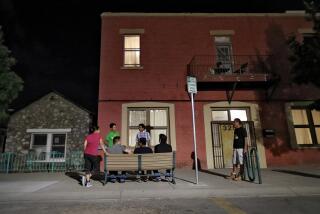Trump administration moves to block victims of gang violence and domestic abuse from claiming asylum

Reporting from Washington — Atty. Gen. Jeff Sessions has ordered immigration judges to stop granting asylum to most victims of domestic abuse and gang violence, a move that could block tens of thousands of people, especially women, from seeking refuge in America.
The decision, which immigration advocates are sure to aggressively fight, comes as Sessions seeks to use the authority of his office to sharply change U.S. immigration law to make it less friendly to asylum seekers.
The attorney general has the power to issue decisions that serve as binding precedents for immigration judges. In this instance, he used a case involving a victim of domestic violence from El Salvador to rule that survivors of such “private” crimes are not eligible for asylum under U.S. law.
The woman, referred to in immigration court as A.B., for her initials, said she was fleeing years of physical and emotional abuse by an ex-husband who had raped her. An immigration judge had denied her asylum claim, but the Board of Immigration Appeals ruled in her favor in 2016, saying the Salvadoran government had shown it was incapable of protecting her, even after she moved to another part of the country.
Sessions’ decision overturned that ruling.
“Generally, claims by aliens pertaining to domestic violence or gang violence perpetrated by non-governmental actors will not qualify for asylum,” Sessions wrote in his ruling. “The mere fact that a country may have problems effectively policing certain crimes — such as domestic violence or gang violence — or that certain populations are more likely to be victims of crime, cannot itself establish an asylum claim.”
He acknowledged the “vile abuse” that the woman reported, but in effect said that U.S. law could not help her.
In a speech earlier in the day to a training session for immigration officials, Sessions telegraphed his position, saying that “asylum was never meant to alleviate all problems — even all serious problems — that people face every day all over the world.”
His anticipated “ruling restores sound principles of asylum and long-standing principles of immigration law,” he said.
Sessions emphasized at the conference that immigration judges will be required to follow his interpretation of the law. Under immigration law, the attorney general’s rulings are binding on immigration judges unless overturned by a federal appellate court.
The decision’s most immediate impact could come long before asylum seekers get to an immigration judge, said Lenni B. Benson, a professor at New York Law School and director of its immigration clinic.
When would-be immigrants arrive at the U.S. border with an asylum claim, they typically first go through a screening interview with border officials. Sessions’ decision sends a clear signal to those officials to reject requests for a hearing from people seeking asylum who say they are trying to escape violent gangs or spouses, Benson said.
“The attorney general seems to be saying you don’t even have to give these people a chance to talk to a [hearing] officer,” she said. As a result, many immigrants detained at the border could be summarily sent home, Benson said.
The attorney general’s decision forms a key part of a broader Trump administration effort to restrict immigration and discourage asylum seekers from coming to the U.S. The administration has also stripped various legal rights from detainees and has been separating families detained by immigration agents.
Sessions’ decision came under immediate attack from Democrats and immigration advocates.
House Minority Leader Nancy Pelosi of San Francisco said in a statement that the administration has “just condemned countless vulnerable, innocent women to a lifetime of violence and even death, just to score political points with their base. This act of staggering cruelty insults our nation’s values.”
The policy Sessions took aim at has been hotly contested over the last two decades. Under the law, people seeking asylum must prove that they have a reasonable fear of persecution because of their race, religion, nationality, political views or “membership in a particular social group.”
Advocates for victims of domestic violence have argued for years that victims of domestic violence could be considered a “social group” subject to persecution.
In 2014, they won a major victory when the immigration appeals board ruled in favor of a Guatemalan woman fleeing domestic violence, establishing a precedent that has allowed many asylum seekers, especially women from Central America, to win cases.
That ruling, a landmark case for immigration law, came about because of policy shifts by the Obama administration, which accepted arguments that victims of domestic violence in Central America merited protection as members of a social group.
The government does not keep statistics on exactly how many asylum claims fall into the categories Sessions is now excluding, but advocates estimate that domestic violence victims seeking asylum number in the tens of thousands each year. According to the U.S. Citizenship and Immigration Services, a backlog of 311,000 asylum claims existed as of late January. Immigration attorneys said they believe a substantial percentage of them fall under the categories Sessions targeted.
“There are many, many Central American women and women from other parts of the world who have been able to obtain protection,” said Denise Gilman, director of the immigration clinic at the University of Texas Law School in Austin. “Many women sitting right now in detention under these claims might lose their right to obtain protection and be deported to dangerous situations.”
The office of the United Nations high commissioner for refugees had urged Sessions against changing the asylum rules. It warned that such action would violate international agreements the U.S. has entered into concerning refugees and would subject victims to being returned to situations in which their lives are in danger.
The American Bar Assn. warned that ending the asylum eligibility for victims of domestic violence “would further victimize those most in need of protection.”
Sessions disregarded that advice, asserting in his 31-page opinion that previous cases had failed to offer compelling legal arguments for why domestic violence survivors in such places as Guatemala and El Salvador should be considered a persecuted social group. He cast doubt on assertions that police in Guatemala often don’t respond to reports of domestic violence and that women trapped in abusive marriages are a distinct group in need of protection by the U.S.
“When an applicant has suffered personal harm at the hands of only a few specific individuals, internal relocation would seem more reasonable” than seeking refuge in the U.S., Sessions wrote.
The attorney general’s skepticism that victims of abuse lack effective recourse in their home countries runs counter to reports published by the U.S. Department of State on human rights conditions in those countries.
Whether the new policy will withstand court challenges remains to be seen. Legal experts said the law offering asylum to victims of domestic abuse and gang violence is well established in precedents that appeals court judges may be loath to set aside, despite the authority of the attorney general to guide asylum rules. But it may be years before the appeals courts weigh in. Until they do, the Sessions ruling stands.
“All the careful advocacy work going on for more than 15 years was undone in one poorly reasoned, shallow opinion,” Benson said. Unlike other sweeping actions by the administration, such as its ban on immigration from certain countries in the Middle East and North Africa or its efforts to crack down on so-called sanctuary cities, the Justice Department’s authority over immigration courts means this action will take effect right away.
“His opinion controls the Board of Immigration [Appeals],” Benson said. “It controls border appeals. We can’t walk into a federal court tomorrow and get an injunction.”
More stories from Evan Halper »
Follow me: @evanhalper
UPDATES:
4:53 p.m.: This article was updated with reaction and additional analysis.
12:55 p.m.: This article was updated with additional detail and analysis.
This article was originally published at 12:35 p.m.
More to Read
Get the L.A. Times Politics newsletter
Deeply reported insights into legislation, politics and policy from Sacramento, Washington and beyond. In your inbox three times per week.
You may occasionally receive promotional content from the Los Angeles Times.











